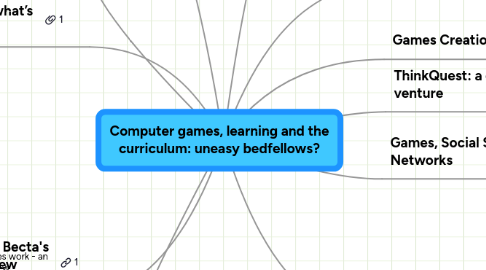
1. Games in schools: a contribution to low achievement
1.1. Impact of gratuitous violence - the staple of many computer games
1.2. Teachers should be in opposition to the games industry
1.3. Computer games are the cultural battleground
2. Consumer Electronics: Becta's Blindspot in the Rearview Mirror
3. Games and Learning: what’s the connection?
3.1. James Gee
3.1.1. Reference
3.2. Games & simulations offer a different way of learning
3.2.1. Relationship of play to learning
3.3. Immersion in games threatens learning
3.3.1. The complex inter-relationships between pleasure and learning
3.4. All teachers should read Baudrillard
3.4.1. Educational games as chocolate-coated broccoli
3.5. Games are like real life, only better
3.5.1. See the James Gee reference
3.5.2. How does online identity relate to off-line
3.6. Playing games involves following rules
3.6.1. Games play and rule following involves being active, rather than passive
3.6.2. Games play involves the suspension of disbelief
3.6.3. Script design vs. script enacting
3.6.4. Could games also allow 'breaking' of rules but in a safe context?
3.6.5. Can games be used to allow learners to create their own rules?
3.7. Thomas Malone Reference - Joe Nutt
3.7.1. Theory of Flow Joe purports that Thomas Malone took from Mihaly Csikszentmihalyi.
3.8. Prensky
4. Why are we still arguing over Gaming in Education?
5. Game - Based Learning Links
5.1. Why serious games work - an over-simplified view.
5.2. Game-Based Learning: What it is, Why it Works, and Where it's Going
5.3. Learning Principles
5.4. Theory and Research-based Principles of Learning
5.5. Video Gaming, Education and Digital Learning Technologies
5.6. What Video Games Have to Teach Us about Learning and Literacy
5.7. Selected URLs and other resources for Game-Based Education, e-Learning and Training
6. Why play games in school?
6.1. See all of the Games-Based learning links that Derek has uploaded
6.2. Haven't teachers always used games in their teaching? So why not computer games?
7. Games in classrooms: enhancing the curriculum and engaging learners
7.1. Secret learning
7.1.1. Enhancing the curriculum
7.1.2. Use of Brain Training programs
7.1.3. Handhelds used in Maths groupwork
